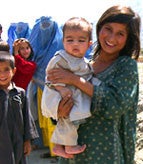News
Assisting Births Around the Clock: Emergency Mobile Hospital To Open in Kabul
- 14 August 2002
News
KABUL - On a dusty football field about 700 yards from Khair Khana Maternity Hospital in northern Kabul, a team of Danish engineers, medical technicians and Afghan personnel have been working tirelessly since early August to erect an emergency mobile hospital, which will help save the lives of countless women and children. Airlifted from Copenhagen, the Danish Emergency Mobile Hospital will replace the 52-bed capacity of Khair Khana Hospital while it undergoes extensive rehabilitation from mid-August to March 2003.

The hospital has one of the only maternity wards in Kabul and must serve a growing population of 2.1 million. The city's health facilities are currently stretched to the limit as large numbers of refugees return to Afghanistan from Pakistan and Iran. In Khair Khana Hospital, two women per bed is the rule, not the exception.
The 72-bed Danish facility is fully equipped to deal with all obstetric emergencies, complicated births and pregnancies and provide treatment for reproductive tract and sexually transmitted infections. It features two operating theatres, an emergency room and other medical facilities. The hospital was previously deployed to Bosnia and Herzegovina and to Gujarat, India, after last year's earthquake.
"The mobile hospital will be operational 24 hours a day and we expect to be assisting births around the clock," said Dr. Finn Warburg, a Danish trauma surgeon and Chief Medical Officer of the mobile hospital.
"We expect to handle 20 to 30 births every day, as well as about 2,000 medical inquiries," said Dr. Warburg. "The Khair Khana receives about 600 a day, but we will run the emergency room, surgical theatres and maternity ward around the clock."
Eight Danish doctors, nurses and medical technicians will collaborate with around 100 medical personnel transferred from Khair Khana Hospital. The Afghan staff will be trained to operate the equipment at the mobile hospital, which is similar to what will be installed in their own hospital during the renovation.
"Eight people can't run this hospital and we won't need to," explained Dr. Warburg. "The training of our Afghan colleagues will begin immediately once the hospital is operational. Doctors and nurses will receive training and staff will be rotated through all the areas of the hospital."
The mobile hospital was procured by UNFPA, with support from donors, in response to a request for assistance from the Afghan Ministry of Public Health. Donors include the Governments of Luxembourg, Italy, the Netherlands and Norway. The Government of Denmark is also independently supporting this project.
The Ministry of Health faced a serious shortage of medical capacity due to the urgent need to renovate and rehabilitate the Khair Khana Hospital. Dr. Warburg emphasized that rebuilding local capacity is a major goal of the partnership with the Ministry and that the Danish medical team was handpicked for their teaching skills and medical expertise.
Dr. Warburg and the other stakeholders face an uphill battle to reduce infant and maternal deaths. Afghanistan has one of the world's highest maternal mortality ratios, with 1,700 deaths per 100,000 live births. Most medical facilities are run down and in dire need of trained personnel. Despite these challenges, Danish trauma doctor and anaesthesiologist Henning Brinkenfeldt remains upbeat.
"Working together with our Afghan colleagues, I feel confident that we can start a benevolent spiral of learning and chip away at maternal and infant mortality," he said. "We will not relent until positive change is at hand, however localized. We're starting right here on this dusty football field."
--Jesper Jensen, Freelance journalist
Contact Information:
William A. Ryan
Tel.: +66 2 288 2446
Email: ryanw@unfpa.org